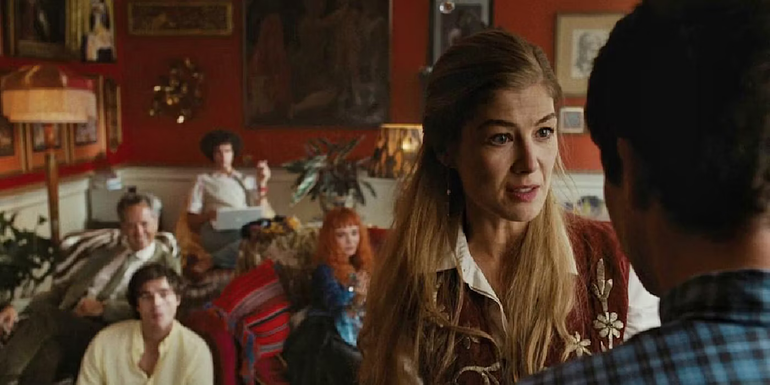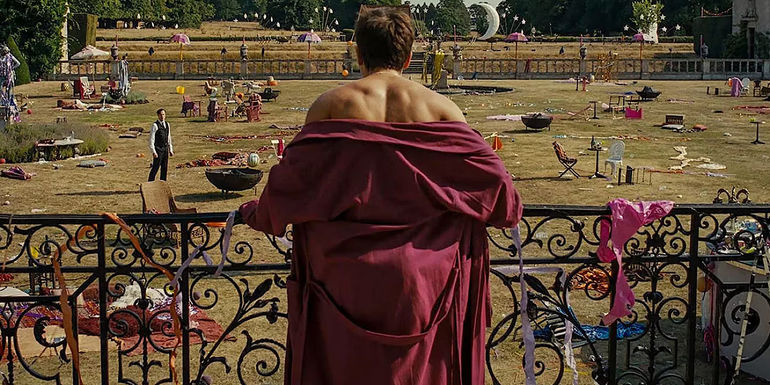
Decoding Saltburn: Unraveling the Themes and Messages of the Polarizing Movie

A deep dive into the enigmatic film Saltburn, exploring its themes of desire, obsession, class, and societal commentary.
Exploring Desire and Obsession
Saltburn delves deep into the themes of desire and obsession, unraveling the complex dynamics of human longing and fixation. The film follows Oliver Quick, played by Barry Keoghan, a middle-class Oxford student who becomes entangled in a web of intense desire for Felix Catton, portrayed by Jacob Elordi. As Oliver is invited to stay at the opulent Saltburn estate, his longing for the luxuries and the upper-class lifestyle of the Catton family becomes an all-consuming obsession. The exploration of love, desire, and obsession forms the crux of the film's narrative, offering a provocative portrayal of human emotions and motivations.
Archie Madekwe as Farleigh with Barry Keoghan as Oliver at Oxford in Saltburn
The thematic exploration of love within the context of desire and obsession adds another layer of complexity to Saltburn. While Oliver insists that he was not in love with Felix, the underlying narrative hints at a deeper emotional entanglement. The film presents a compelling examination of the lengths to which individuals will go to fulfill their desires, blurring the lines between love, attraction, and obsession. Barry Keoghan's performance in the lead role has earned him a well-deserved nomination for Best Actor at the Golden Globes, showcasing the depth and intensity of his portrayal.
Sir James Catton is sitting at the table, wearing glasses, and has a napkin tucked in his shirt in Saltburn.
Unraveling the Themes of Class and Wealth
Classism and the class divide take center stage in Saltburn, offering a thought-provoking commentary on societal inequalities. The film portrays the juxtaposition between Oliver's middle-class background and the extravagant wealth of the Catton family, embodied by the sprawling Saltburn estate. While the initial fascination with Oliver as a novelty reflects the class dynamics, the film's treatment of the class issue raises questions about its underlying messaging.
Elspeth is speaking to Oliver with the rest of the Catton family and Pamela behind her in Saltburn.
The absence of a clear commentary on the class problem within the film creates a significant narrative challenge. Saltburn's portrayal of the rich and the lower classes lacks a critical lens, leading to a portrayal that seemingly glorifies the opulence of the elite while disregarding the struggles of the working class. The twist ending, revealing Oliver's sinister intentions to exploit the Catton family, further complicates the film's stance on class and wealth, raising ethical and moral dilemmas.
Oliver is wearing a robe and looks out at the mess on the estate grounds in Saltburn.
The Moral Ambiguity of Saltburn
Saltburn navigates a morally ambiguous terrain, blurring the lines between protagonist and antagonist. The character of Oliver Quick undergoes a transformation that challenges traditional notions of heroism and villainy. While the film hints at a 'eat the rich' message, the portrayal of Oliver as an emotionless sociopath undermines any sense of victory for the character. The thematic exploration of societal power dynamics and the consequences of unchecked desire adds layers of complexity to the narrative, presenting a compelling but morally unsettling portrayal.
Lady Elspeth Catton is holding a drink in Saltburn.
Despite its moral ambiguity, Saltburn's entertainment value and narrative twists offer a compelling viewing experience. The film's unexpected plot developments and the portrayal of Oliver as a conniving criminal mastermind draw parallels with classic thrillers. However, the film's larger societal commentary and messaging struggle to align with its entertaining elements, resulting in a conflicted and perplexing cinematic experience.
Felix is smiling over his shoulder with the estate in front of him in Saltburn.













